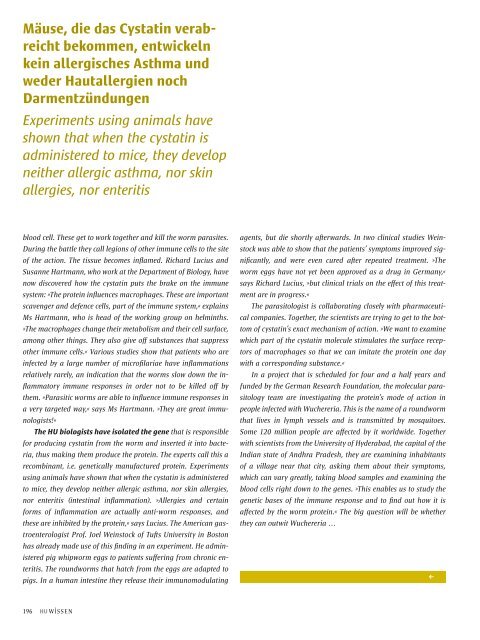hu wissen (pdf) - Exzellenzinitiative - Humboldt-Universität zu Berlin
hu wissen (pdf) - Exzellenzinitiative - Humboldt-Universität zu Berlin
hu wissen (pdf) - Exzellenzinitiative - Humboldt-Universität zu Berlin
Sie wollen auch ein ePaper? Erhöhen Sie die Reichweite Ihrer Titel.
YUMPU macht aus Druck-PDFs automatisch weboptimierte ePaper, die Google liebt.
Mäuse, die das Cystatin verabreicht<br />
bekommen, entwickeln<br />
kein allergisches Asthma und<br />
weder Hautallergien noch<br />
Darmentzündungen<br />
Experiments using animals have<br />
shown that when the cystatin is<br />
administered to mice, they develop<br />
neither allergic asthma, nor skin<br />
allergies, nor enteritis<br />
blood cell. These get to work together and kill the worm parasites.<br />
During the battle they call legions of other immune cells to the site<br />
of the action. The tissue becomes infl amed. Richard Lucius and<br />
Susanne Hartmann, who work at the Department of Biology, have<br />
now discovered how the cystatin puts the brake on the immune<br />
system: »The protein infl uences macrophages. These are important<br />
scavenger and defence cells, part of the immune system,« explains<br />
Ms Hartmann, who is head of the working group on helminths.<br />
»The macrophages change their metabolism and their cell surface,<br />
among other things. They also give off substances that suppress<br />
other immune cells.« Various studies show that patients who are<br />
infected by a large number of microfi lariae have infl ammations<br />
relatively rarely, an indication that the worms slow down the infl<br />
ammatory immune responses in order not to be killed off by<br />
them. »Parasitic worms are able to infl uence immune responses in<br />
a very targeted way,« says Ms Hartmann. »They are great immunologists!«<br />
The HU biologists have isolated the gene that is responsible<br />
for producing cystatin from the worm and inserted it into bacteria,<br />
t<strong>hu</strong>s making them produce the protein. The experts call this a<br />
recombinant, i.e. genetically manufactured protein. Experiments<br />
using animals have shown that when the cystatin is administered<br />
to mice, they develop neither allergic asthma, nor skin allergies,<br />
nor enteritis (intestinal infl ammation). »Allergies and certain<br />
forms of infl ammation are actually anti-worm responses, and<br />
these are inhibited by the protein,« says Lucius. The American gastroenterologist<br />
Prof. Joel Weinstock of Tu� s University in Boston<br />
has already made use of this fi nding in an experiment. He administered<br />
pig whipworm eggs to patients suff ering from chronic enteritis.<br />
The roundworms that hatch from the eggs are adapted to<br />
pigs. In a <strong>hu</strong>man intestine they release their immunomodulating<br />
196<br />
agents, but die shortly a� erwards. In two clinical studies Weinstock<br />
was able to show that the patients’ symptoms improved signifi<br />
cantly, and were even cured a� er repeated treatment. »The<br />
worm eggs have not yet been approved as a drug in Germany,«<br />
says Richard Lucius, »but clinical trials on the eff ect of this treatment<br />
are in progress.«<br />
The parasitologist is collaborating closely with pharmaceutical<br />
companies. Together, the scientists are trying to get to the bottom<br />
of cystatin’s exact mechanism of action. »We want to examine<br />
which part of the cystatin molecule stimulates the surface receptors<br />
of macrophages so that we can imitate the protein one day<br />
with a corresponding substance.«<br />
In a project that is scheduled for four and a half years and<br />
funded by the German Research Foundation, the molecular parasitology<br />
team are investigating the protein’s mode of action in<br />
people infected with Wuchereria. This is the name of a roundworm<br />
that lives in lymph vessels and is transmitted by mosquitoes.<br />
Some 120 million people are aff ected by it worldwide. Together<br />
with scientists from the University of Hyderabad, the capital of the<br />
Indian state of Andhra Pradesh, they are examining inhabitants<br />
of a village near that city, asking them about their symptoms,<br />
which can vary greatly, taking blood samples and examining the<br />
blood cells right down to the genes. »This enables us to study the<br />
genetic bases of the immune response and to fi nd out how it is<br />
aff ected by the worm protein.« The big question will be whether<br />
they can outwit Wuchereria …<br />
v



